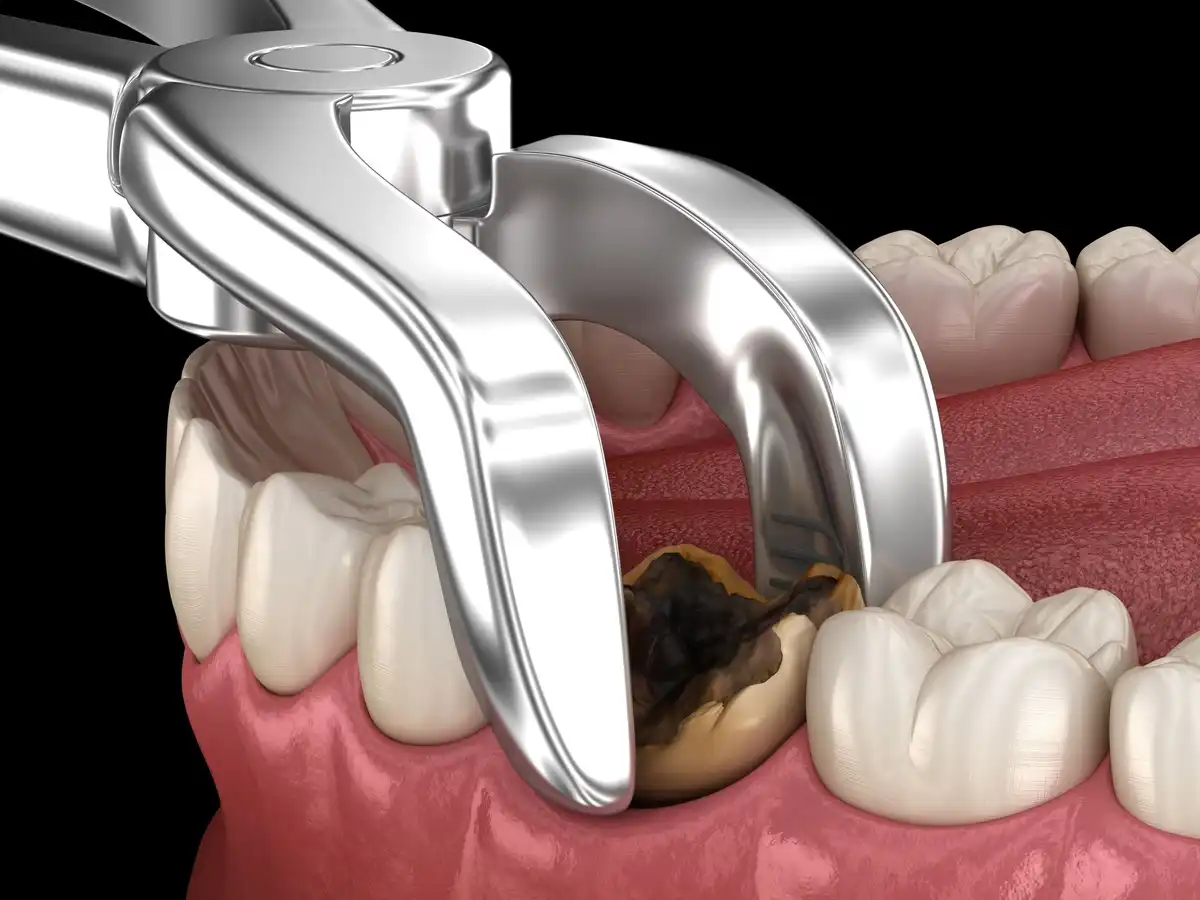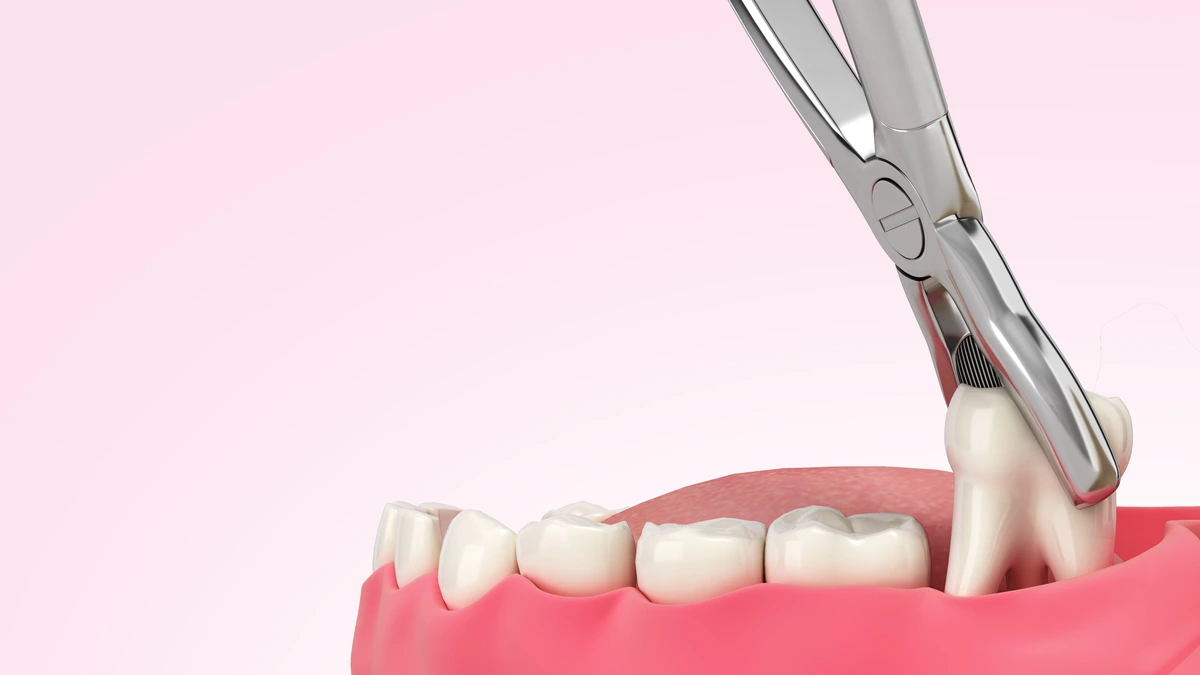Cost to Extract a Tooth With & Without Insurance


Whether you need a routine or emergency tooth extraction, cost can be a barrier. The average tooth removal cost can vary by hundreds or even thousands of dollars, depending on which part of the country you live in, whether or not the tooth removal is being completed under anesthesia or sedation, and the type of dental extraction it is. You might find a simple, emergency tooth removal cost of $99 in one place, or a sedation wisdom tooth extraction cost of $1,000 in another.
Knowing what to expect before you call the dentist’s office can help you avoid sticker shock, while still affording the care you need.
Do I Need A Tooth Pulled?
Even though it’s tempting to pull a problematic tooth, it’s recommended that you try to keep your natural teeth when possible. Wisdom teeth are the only exception since they’re hard to reach and prone to problems. But it’s best to exhaust other options for non-wisdom teeth before extracting them. For instance, performing a root canal or placing a crown over your tooth can extend its lifespan for quite some time. Whereas extracting it creates a chain reaction that impacts your entire mouth. Root canal and dental crowns will increase the total price of the procedure.

A dentist or oral surgeon will usually suggest a tooth extraction due to the following circumstances:
- It cannot be repaired
- There is severe gum disease, causing tooth mobility
- You’re getting a denture
- Orthodontic complications
- Traumatic injuries
- Painful emergencies
- Aggressive dental abscesses
Even though a simple tooth extraction may seem like the best, fastest solution, you’ll want to think ahead. What will be the side effects of removing that tooth and which options are available to deal with them when you get to that point? Each of these factors will impact your total tooth extraction costs.
How Much Is Tooth Extraction Removal?
| Tooth Extraction Type | Average Cost per Tooth | With Insurance Per Tooth |
|---|---|---|
| Simple | $75 to $300 | $25 to $145 |
| Simple Emergency | $300 to $450 | $90 to $180 |
| Surgical | $150 to $650 | $45 to $220 |
| Wisdom Tooth | $200 to $700 | $60 to $260 |
Some of the issues that directly impact the dollar amount of tooth extractions are:
- The type of tooth you’re extracting
- If it’s a baby or adult tooth
- How simple the removal is (Is it covered with gum tissues? Encapsulated within bone?)
- Whether the removal is simple or surgical
- Will pieces of the tooth need to be segmented to remove them?
- If you have insurance and the type of plan you’re enrolled in
- The type of sedation you want, if applicable
- Will a bone graft be required?
If your tooth extraction is a simple one, you’re only adding on $20-40 of nitrous oxide (laughing gas) and your insurance covers 80% of the tooth removal, you might be out of pocket less than $100. $200 for single tooth extraction isn’t unheard of, either. If the tooth is unerupted and is only impacted in gum tissue, the extraction could range from a little over $800 to up to $4,000. Sometimes it’s cheaper per tooth when multiple teeth are being removed at the same time, like if you’re getting dentures or dental implants.
Tooth Extraction Costs Without Insurance
Worst case scenario, you may need a tooth extraction for pain relief or emergency purposes even if you don’t have dental insurance. Extractions tend to be one of the most initially affordable treatments, which is why so many people prefer them when they’re in pain. Without insurance, you’re likely looking at around $100-$200 just for a simple, basic tooth removal. That’s if the tooth is easy to extract and nothing surgical is involved. For a surgical extraction—like with wisdom teeth—and you’re paying cash, it is probably going to be a minimum of $250 per tooth, with costs as high as $700 per wisdom tooth.
Remember that the cost of the actual tooth removal is just part of the fees you’ll pay. This cost does not include any dental sedation or tooth replacement treatment afterward. Sedation can range from $20 for laughing gas to $500 minimum for “twilight” sedation. Depending on your comfort level, you’ll want to consider those extra charges before rushing into an office to get your tooth pulled.
Related: 6 Best Dental Discount Plans
Are Tooth Extractions Cover By Insurance?
Most tooth extractions are covered, at least partially, by dental insurance. You’ll still need to meet your deductible and/or copay, per your insurance terms.
The average dental insurance policy will pay for about 70% to 80% of your tooth extraction costs. You’ll be financially responsible for the remaining amount. Some offices also have you pay upfront and then reimburse you for what your insurance pays for, depending on their office policy.
Some insurance plans cover closer to 50% of the procedure, depending on which type of policy you’re enrolled in. This might be the case if you need a surgical extraction, like when you’re having wisdom teeth removed.
The best way to know how much your extraction will cost with dental insurance is to schedule a consultation with at least one or two dentists. Their care planning professionals will work up a financial plan for you that outlines your estimated coverage and itemized fees related to your care.
Risks of Tooth Removal
The Cheapest Way To Get Tooth Extractions
If you’re worried that you won’t be able to pay for a tooth extraction, here are four cost-saving options:
Dental Schools
Dental Savings Plans
You can save 10% to 60% on tooth extraction costs. Dental plans are not dental insurance. Dental savings plans allow you to save on the average cost of dental procedures. They have nationwide savings with over 100,000 dentists in the program, see if you can save with a dentist near you.
Payment Plans and Dental Office Memberships.
Plenty of dental patients don’t have dental insurance. Or they do, but it doesn’t cover everything they wished it would. That’s why most dentists offer flexible payment plans. You can easily budget the total cost of your procedure on a month-to-month basis, making small monthly payments without having to wait on the actual treatment. Financing gives you fast relief without breaking the bank. Most dental financing plans are either at 0% interest for 6-12 months or have low-interest financing. And if you don’t have insurance at all, be sure to ask your dentist or oral surgeon if they offer an in-house membership savings plan.
Ask for a Cash Discount
If you don’t have dental insurance, ask the dentist if you can pay cash. They may be able to offer you a lower rate cash discount, depending on where the practice is located and what the state insurance laws are. Senior citizens can ask for discounts too. The types of discounts you see won’t be as low as what’s at a dental school, but it could easily be 10-15% off the cost of a dental extraction.
What To Expect From A Tooth Extraction
After any tooth extraction, you’ll need to take it easy for at least a couple of days. Vigorous exercise or a rise in blood pressure could delay healing, putting you at risk for a painful dry socket. Make sure you clean your mouth properly and stick to soft foods for several days. Any irritation, smoking, alcohol, or other risk factors can jeopardize your recovery following a tooth extraction (whether it’s simple or surgical!)
Removing a tooth helps to establish a healthier, pain-free environment inside your mouth. There will no longer be an active cavity or infection in that space, potentially jeopardizing your adjacent teeth. That being said, there’s now an open space in your smile that changes the way you look and how you eat. After your mouth heals, you’ll want to plan to replace your missing tooth ASAP. Otherwise, your neighboring teeth will start to tilt out of alignment; your entire smile could be affected.
How Much Does It Cost To Have Wisdom Teeth Removed?
Typically, wisdom tooth removal costs tend to be more than double that of a simple tooth extraction. Especially if they’re embedded down in the bone. Most people prefer to have their wisdom teeth all removed at once and while they’re under sedation. For that reason, it’s not unheard of for wisdom tooth costs to range anywhere from $225 to $3,500 or more. Getting a 2nd or 3rd opinion can help you budget better.
Tooth Extraction Costs
Tooth extraction costs will vary from person to person and office to office. Keep in mind that you will also want to budget for replacing your missing teeth, which can add to your overall price. It’s possible to access affordable tooth removal cost, even if you don’t have dental insurance. Especially if you’re near a dental school or your dentist offers a payment plan!

Make your inbox smile!
Subscribe





